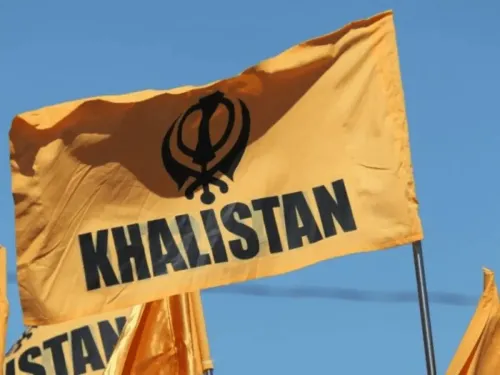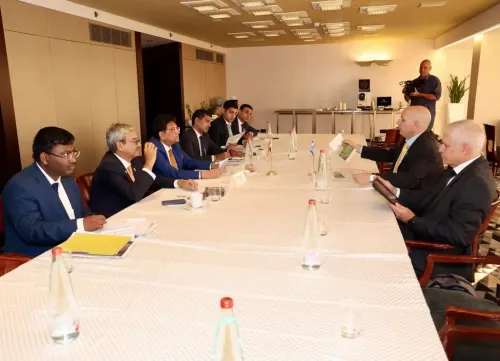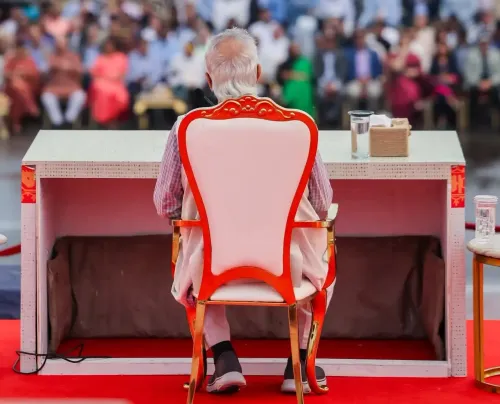Why does Trump value the Indo-Pacific but think AUKUS alone is insufficient?

Synopsis
Key Takeaways
- AUKUS is central to US military strategy in the Indo-Pacific.
- Reviving AUKUS marks the beginning, not the end, of a comprehensive strategy.
- The Quad and Squad must also be revitalized to ensure regional stability.
- Strengthening ties with India is crucial for maintaining AUKUS.
- The Indo-Pacific is undergoing significant strategic shifts.
Washington, Nov 20 (NationPress) After playing a pivotal role in forming various security alliances such as AUKUS, the Quad, and the Squad—a combined framework designed to counter China's expansion—the decision by the US administration to advance with AUKUS indicates that President Donald Trump still acknowledges the importance of the Indo-Pacific, as reported on Thursday.
The three security alliances had faced challenges during the Trump administration, raising alarms in Australia, Japan, India, and the Philippines. Trump's recent discussions with Australian Prime Minister Anthony Albanese brought significant reassurance, as the US President affirmed that his administration would continue its commitment to deliver armed, nuclear-powered submarines to Australia under AUKUS, according to India Narrative.
"This decision puts an end to months of uncertainty regarding the future of the pact. However, if the administration believes that simply providing submarines resolves America’s strategy in the Indo-Pacific, it misreads the region’s shifting security landscape. Earlier this year, when the White House stated that AUKUS was 'under review', many analysts interpreted this as a sign of a potential US withdrawal," noted Indian policy analyst and Asia expert Somen Chatterjee.
The simultaneous scrutiny of all three alliances by the US administration indicates not a flexible strategy but rather a strategic drift. AUKUS forms the cornerstone of long-term allied military deterrence in the Indo-Pacific and serves two essential roles: supplying nuclear-powered submarines to Australia, which can operate undetected for extended periods, and fostering technological collaboration in areas such as cybersecurity, AI, and undersea warfare. These capabilities are crucial for countering China's naval growth and gray-zone tactics.
"The positive aspect is that Trump ultimately aligned with the strategic rationale of AUKUS rather than succumbing to the temptation of viewing allies as mere customers in a transactional geopolitical setting. However, rejuvenating AUKUS should be regarded as the start and not the endpoint of a well-rounded Indo-Pacific strategy," the report emphasized.
With AUKUS seemingly stabilizing, the actual challenge lies in revitalizing the Quad and reinvigorating the struggling Squad. The Quad, consisting of India, the US, Japan, and Australia, is more than just a maritime coordination entity; it has evolved into a multifaceted regional platform. Its future hinges on the relationship between India and the US. Strengthening US-India relations will be vital for Trump to prevent AUKUS from collapsing.
"The Indo-Pacific isn't pausing for Washington to reassess its approach. China is probing boundaries. Allies are hedging their bets. Countries from Vietnam to South Korea are reevaluating their reliance on the United States. The administration’s choice to proceed with AUKUS indicates Trump's recognition of the Indo-Pacific’s relevance. However, reviving one element is insufficient. The US must dedicate political capital to revitalize the Quad's momentum and finally operationalize the Squad," Chatterjee wrote.
"While AUKUS provides Australia with submarines, the Quad delivers governance, and the Squad ensures frontline deterrence. Only in unison do they create a comprehensive strategy. America’s 'America First' policy can still align with an Indo-Pacific that remains free, open, and governed by rules rather than coercion. However, this demands more than merely reassessing alliances—it necessitates active engagement with them," he added.









